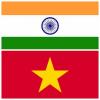The Syrian Détente. Is This the End of the Unipolar Moment?
In his famous 1990 essay in Foreign Affairs, Charles Krauthammer had declared that the unipolar moment had arrived. He had listed a few reasons to support his argument; there was no challenging power, nor was there likely any in the few decades, there was no power dispersion at the international level at that moment, the former Soviet Union’s capacity was in a decline. Thus, Krauthammer emphasised, at that time there was no first-rate power in the world that could match the capacity of the US.







